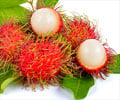New studies on the fruit fly Drosophila melanogaster have suggested that pancreatic cancer, the most lethal form of human cancer, may be treated by targeting proteins whose DNA recipe
New studies on the fruit fly Drosophila melanogaster have suggested that pancreatic cancer, the most lethal form of human cancer, may be treated by targeting proteins whose DNA recipe comes from the gene Seven-In-Absentia (SINA).
While presenting their work at the ongoing 48th annual meeting of the American Society for Cell Biology (ASCB) in San Francisco, researchers from the Minnesota-based Mayo Clinic College of Medicine revealed that they had found a link between the SINA gene and the aggressive cellular transformation, oncogenesis and metastasis that characterize pancreatic cancer.The researchers said that the 'Seven-In-Absentia-Homolog' (SIAH) protein seems to be work as a check and balance mechanism in the K-RAS gene, which is known to underlie the abnormal cell growth of pancreatic cancer.
Lead researcher Amy Tang said that SIAH was found to turn off the excessive growth-promoting proteins produced by the hyperactive, mutated form of the gene, during the study.
"By attacking the SIAH-based protein degrading machinery, we block tumor formation in one of the most aggressive human cancers cells known," she said.
Based on their observations, the researchers came to the conclusion that SIAH might be an attractive new target for novel anti-RAS and anti-cancer therapy in pancreatic cancer, the median survival of which is only six months, and the mortality rate is 95 percent.
Tang said that inhibiting SIAH function enabled her team to completely abolish both tumorigenesis and metastasis of human pancreatic cancer cells, which were growing in "nude" mice that have immune system deficits that prevent them from rejecting foreign tissue.
Advertisement
She said that, in humans, the SIAH ubiquitin ligases sit smack in the middle of the molecular pathway that leads to pancreatic cancer.
Advertisement
The increased SIAH expression seemed to correlate with aggressiveness of pancreatic cancer. Moreover, SIAH is normally required for mammalian K-RAS signal transduction.
Source-ANI
SRM















